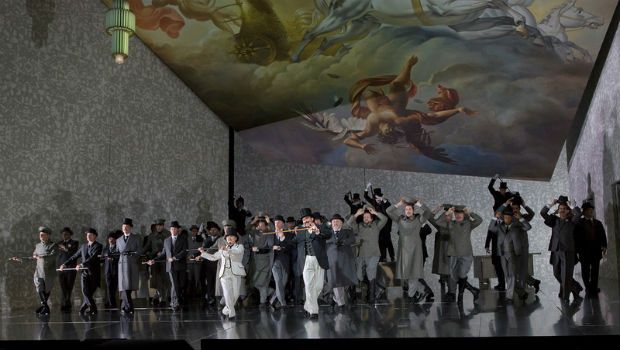I imagined, Gentle Readers, that compiling this year's retrospective of opera-going would present fairly few challenges. Folly! Reviewing this year's performances (an admittedly indulgent practice) has shaken my confident creation of hierarchies and left stray runners-up begging for attention. So here, a little more disorderly than usual, are my lists for the year.
5 Nights When Everything (or Almost Everything) Went Right:
Emilie: I usually resist to the utmost of my power the declaration of Absolute Favorites, but for this year, this opera by Kaija Saariaho might be it. A tautly constructed opera, creatively orchestrated, with a great libretto, centered on the accomplishments and inner life of an eighteenth-century noblewoman-philosopher... what's not to love?
Le Roi Malgré Lui: Frothy French operetta in a sly 1930s-Hollywood production? Yes, please. The zany screwball antics of Thaddeus Strassberger's production were smart enough to keep me intrigued as well as entertained, and the fearless and talented cast won my heart. Perhaps most importantly, Emmanuel Chabrier's score is in on the jokes of frothy French operetta.
Un Ballo in Maschera: If using the tropes of films of the '30s and '40s is a directorial trend, I applaud it. Not only do I think it has great potential as a vehicle for playing around with the treatment of gender that bedevils much of the nineteenth-century rep, and the shades-of-grey politics ditto, it also has great potential for gratifying my taste for Art Deco, Ingrid Bergman hats, and three-piece suits. David Alden's production was not without weaknesses, but its melodramatic moodiness suited the work well, and the singing was very fine. Standouts in a strong cast were Sondra Radvanovsky and Dmitri Hvorostovsky as Amelia and Renato, both tortured by divided affections.
La Clemenza di Tito: This was an unexpected late highlight of the Met's fall season. Jean-Pierre Ponnelle's production has stood the test of time, the orchestra was on fine form under Harry Bicket, and the vocal and dramatic performances were all strong. The performance combined sensuality, political tension, even an element of humor thanks to Barbara Frittoli's excellent Vitellia, and I fell in love with Mozart all over again.
Götterdämmerung: This managed to be a really searing, satisfying performance despite Robert Lepage's production. Having lavished adjectives of scorn and disillusionment on it, I'd like to now give it the cold shoulder. Waltraud Meier's Waltraute might be enough to convey epic grandeur to just about anything; the performances of the Gibichungs were vocally strong and dramatically nuanced; and Deborah Voigt and Jay Hunter Morris were an intensely moving Brunnhilde and Siegfried.
5 Nights When Everything (or Almost Everything) Went Right:
Emilie: I usually resist to the utmost of my power the declaration of Absolute Favorites, but for this year, this opera by Kaija Saariaho might be it. A tautly constructed opera, creatively orchestrated, with a great libretto, centered on the accomplishments and inner life of an eighteenth-century noblewoman-philosopher... what's not to love?
Le Roi Malgré Lui: Frothy French operetta in a sly 1930s-Hollywood production? Yes, please. The zany screwball antics of Thaddeus Strassberger's production were smart enough to keep me intrigued as well as entertained, and the fearless and talented cast won my heart. Perhaps most importantly, Emmanuel Chabrier's score is in on the jokes of frothy French operetta.
Un Ballo in Maschera: If using the tropes of films of the '30s and '40s is a directorial trend, I applaud it. Not only do I think it has great potential as a vehicle for playing around with the treatment of gender that bedevils much of the nineteenth-century rep, and the shades-of-grey politics ditto, it also has great potential for gratifying my taste for Art Deco, Ingrid Bergman hats, and three-piece suits. David Alden's production was not without weaknesses, but its melodramatic moodiness suited the work well, and the singing was very fine. Standouts in a strong cast were Sondra Radvanovsky and Dmitri Hvorostovsky as Amelia and Renato, both tortured by divided affections.
La Clemenza di Tito: This was an unexpected late highlight of the Met's fall season. Jean-Pierre Ponnelle's production has stood the test of time, the orchestra was on fine form under Harry Bicket, and the vocal and dramatic performances were all strong. The performance combined sensuality, political tension, even an element of humor thanks to Barbara Frittoli's excellent Vitellia, and I fell in love with Mozart all over again.
Götterdämmerung: This managed to be a really searing, satisfying performance despite Robert Lepage's production. Having lavished adjectives of scorn and disillusionment on it, I'd like to now give it the cold shoulder. Waltraud Meier's Waltraute might be enough to convey epic grandeur to just about anything; the performances of the Gibichungs were vocally strong and dramatically nuanced; and Deborah Voigt and Jay Hunter Morris were an intensely moving Brunnhilde and Siegfried.
Runners-up: Khovanschchina (not reviewed,) Billy Budd, and L'Elisir d'Amore (not the new one.)
5 Standout Performances (in no particular order):
5 Standout Performances (in no particular order):



















CATHERINE%20ASHMORE.jpg)







